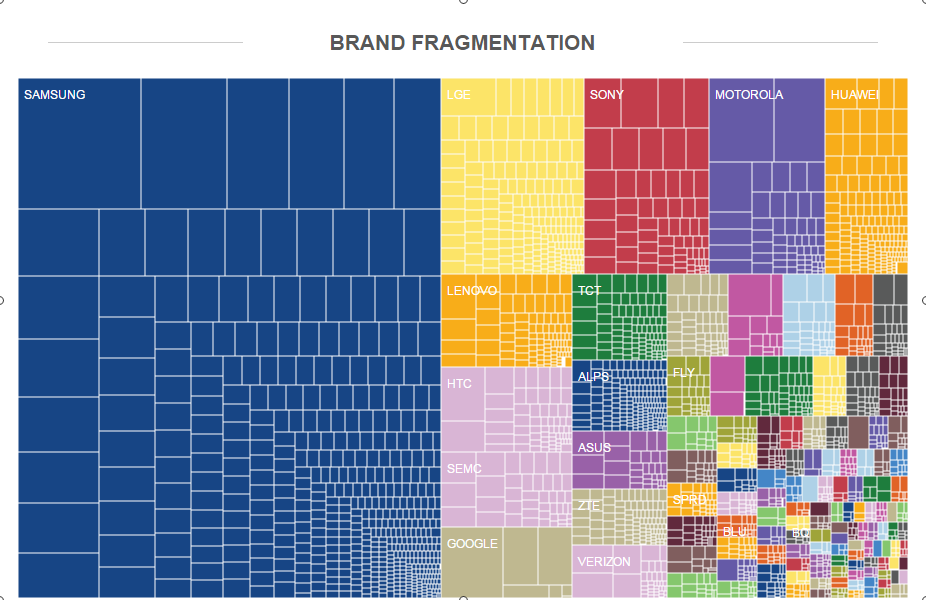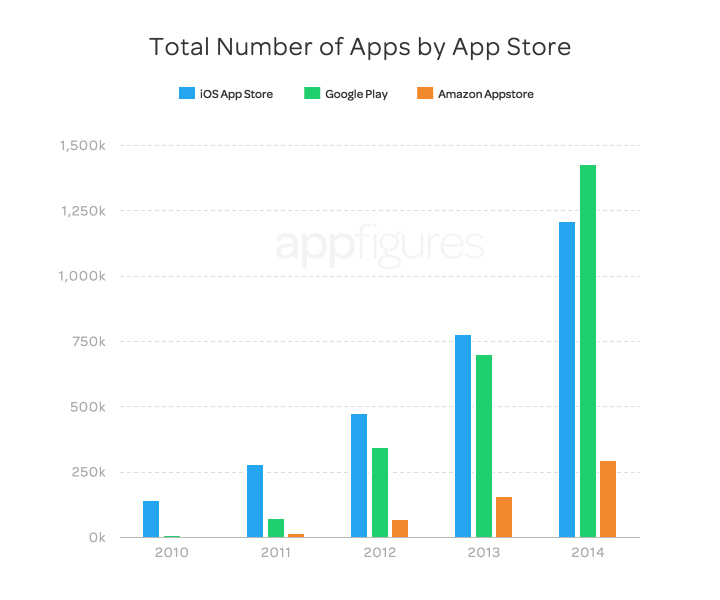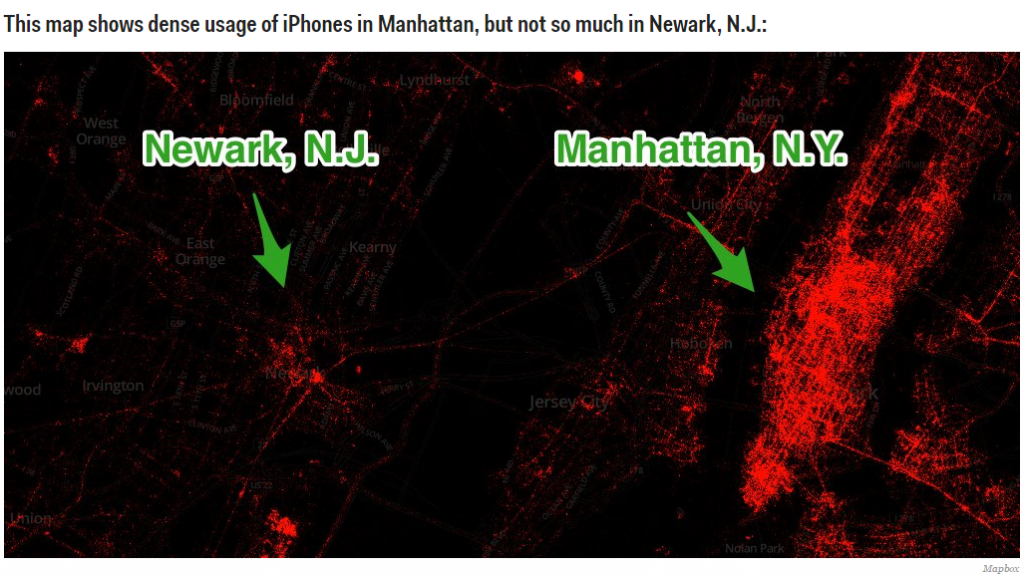Download our E-BOOK
5 Reasons Why App Developers Still Choose Apple Before Android
February 17, 2015
by Ashley Rondeau
Time.com declared the smartphone app war over and touted Apple as the winner. While we are not so bold, it’s clear that as of early 2015 Android is still playing catch up to Apple in terms of luring app developers to build for it first. In a perfect world (well, for developers), it would be easy to build simultaneously, but the nuances of both ecosystems keep cross-platform builds a daunting task.
So they pick Apple first, and they’re not wrong. Here are a few reasons why:
1. Android fragmentation is still an issue.
We’ll be the first to admit that the fragmentation issue is overblown. Since the dawn of Android 4.0 and higher, many of the woes developers faced building for the various android devices have gone away, and screen sizes for the most popular devices have somewhat stabilized.
At a recent tech conference, app developer Russell Ivanovic (Pocket Casts) took the stage to explain how “standardized screen resolutions for Android have taken much of the guesswork out of how his app will look and behave on various devices.” Sure there are some variations, he said, but it’s not that hard.
Of course, the tech conference in question was a Google I/O event.
Meanwhile, the August 2014 Android fragmentation report from OpenSignal still shows a daunting amount of devices on the market:
 OpenSignal
OpenSignal
Even developing for Samsung alone, which has 43% of the Android market, means dealing with a wide range of devices in terms of screen size, RAM, versions of Android, and other specs. Compared to this, the Apple ecosystem of devices seems downright simple, though the arrival of larger screens in the iPhone 6 and 6+ have added some fragmentation. Still, developers know that it’s just easier to build an app for Apple products due to this issue.
2. Less time debugging, more time actually coding.
Ask any developer what she likes to do more: code or chase down bugs. Naturally a coder wants to code. In a recent report, the majority of Apple developers said they spent most of their time coding, while the majority of Android developers spent their time testing and debugging.
With the amount of devices to test your app on (see point #1 above), it’s no wonder this is the case. It’s like asking whether a chef wants to spend all his time cooking or making sure his customers don’t get sick.
Furthermore, compared to iOS, the tools developers have access to are not as good and the API is more difficult to work work. Apple’s guidelines and UIkit are just slicker to use, so much so that some developers feel building and releasing on Android costs 2-3 times more than iOS.
3. Surprise! The Android app marketplace is more crowded.
It seems like just yesterday that Android was struggling to match the number of apps on Apple’s App Store. Well, it was but not anymore. Just in the past year, Android overtook Apple in this regard:
And though different app categories have different levels of saturation, it’s clear that moving forward launching an app for Android will be met with increasing competition. This growth is due to a number of factors, but a major one is that Android overall has a lower bar for app quality. Simply put, Google Play and other Android app stores allow far more crappy apps (let’s call them crapps) to permeate their ecosystem than Apple allows. Developers who believe in releasing high quality apps still turn to Apple first.
4. Security is a major issue in Android.
With seemingly a new major security breach every other week these days, consumers are becoming more savvy discerning when software might be more trouble than its worth. Unfortunately, Android’s security problem is getting worse, not better.
In 2012, a report showed 79% of all malware infecting mobile phones were on an Android device. This was up from 66.7% in 2011. In 2014? A new report showed that 99% of infected devices ran Android. Ouch.
Android’s open ecosystem makes it much easier for black hats to attack the OS, and this doesn’t seem like an issue Google is taking seriously enough, especially in light of customers demanding more and more security and privacy. Meanwhile, Apple’s side of the fence looks positively spotless as their tight ecosystem, while somewhat restrictive, keeps users safe from malware.
Patching vulnerability after vulnerability and dealing with the headaches of viruses are problems developers hate to deal with, especially for smaller teams who simply don’t have the bandwidth to maintain such vigilance. Why contend with the issue when developing for iOS avoids it altogether?
5. Apple is still where the money is.
At the end of the day, it all comes down to the almighty dollar. Sure, Android has the attention of the developing world. Some reports show over 84% of global mobile users have Android devices (Q3, 2014), and this number is poised to grow as more and more budget Android devices reach market. However, the market for app purchases in the developing world is only a fraction of what it is in the US, and most app purchasers in the US are with Apple.
Even with under 15% of the smartphone user share, Apple’s iOS ecosystem generates a whopping 85% more revenue for developers than Android, a number that simply can’t be ignored if you’re in the business of staying in business.
It’s not noble. It’s not pretty. In fact, it’s a downright unnerving look into the socioeconomic divide between the haves and have-nots, as BusinessInsider so clearly mapped out for us:

BusinessInsider
The affluent use iPhones, and the people who use iPhones buy many more apps and in-app purchases than those that own Android devices. From the TheCheatSheet article linked to earlier, “Apple has already achieved 98 percent iOS penetration with Fortune 500 companies and 92 percent with Global 500 companies.” You just can’t ignore those numbers.
It’s as simple as that, and it’s by far the most compelling case as to why developers still put Apple first.
The future
So, in light of that last haymaker, is Android destined to be an also-ran in the hearts and minds of app developers? In the short term, it’s hard to argue against the facts: apps for Apple still make the most sense. But the future is wide open, especially if both Google and young developers can work together to make Android a more friendly ecosystem to build in. Android definitely isn’t going anywhere and their numbers are growing around the world, and that is a future that app developers won’t be able to ignore.
For more insights into the mobile app industry, follow our Twitter,Facebook, LinkedIn or RSS feeds.
Related Blog & Posts

How to Increase conversion in 2025
With over 25 years in technology and product development, Dan leads Rocket Farm Studios with a commitment to innovation and growth.
Ready to turn your app idea into a market leader? Partner with Rocket Farm Studios and start your journey from MVP to lasting impact.”
Teams for App Development
We help companies build their
mobile app faster with go to market strategy

Technology and UX Audits

Early Design Sprints

MVP Creation

App Store

Growth Teams
Download Our Free E-Book
Whether you’re launching a new venture or scaling an established product, Rocket Farm Studios is here to turn your vision into reality. Let’s create something extraordinary together. Contact us to learn how we can help you achieve your goals.






